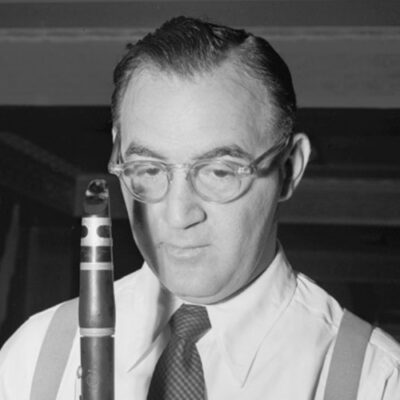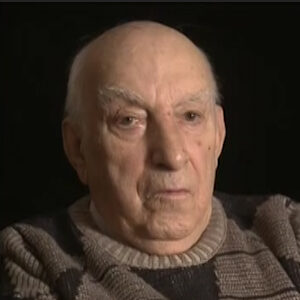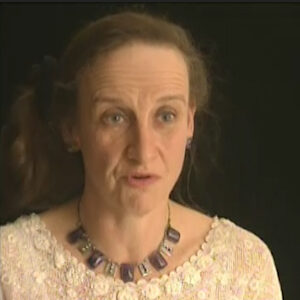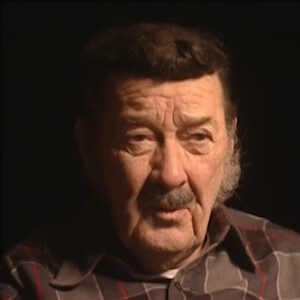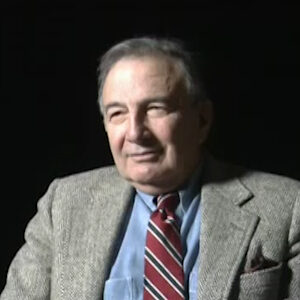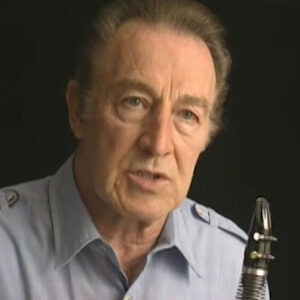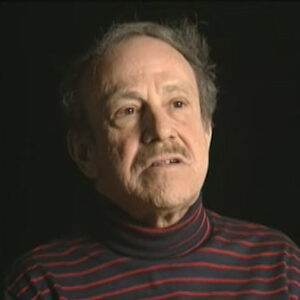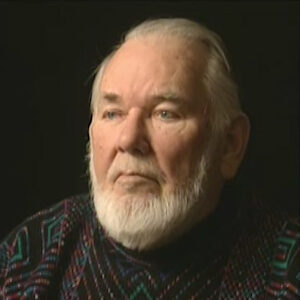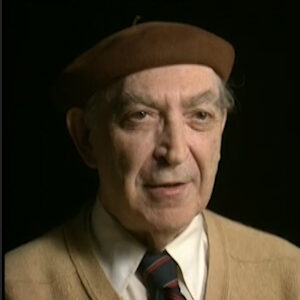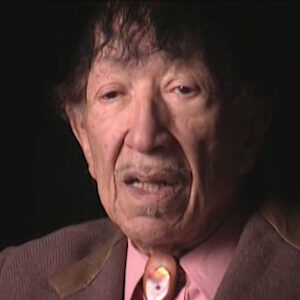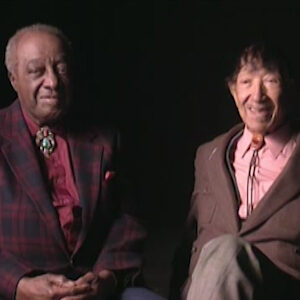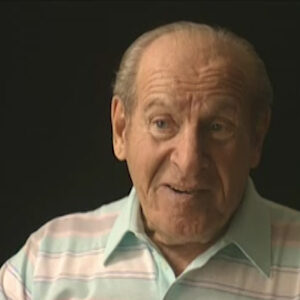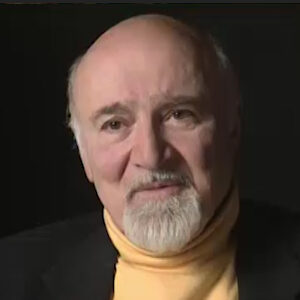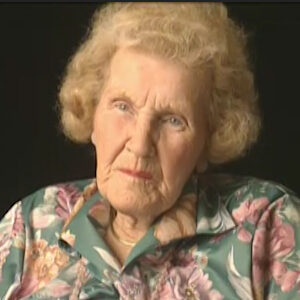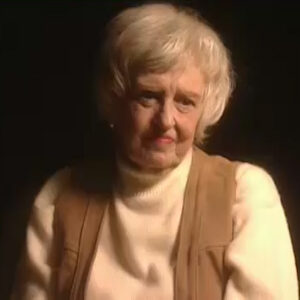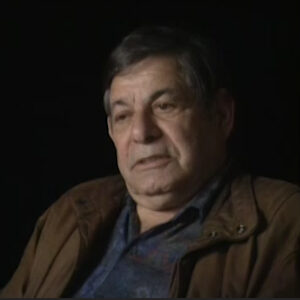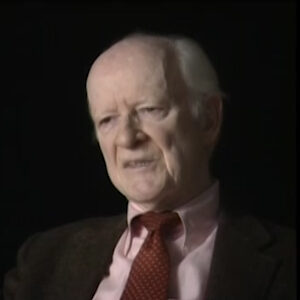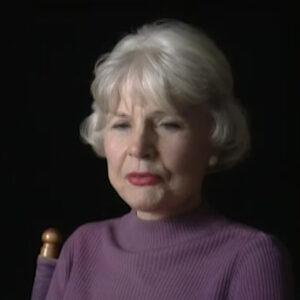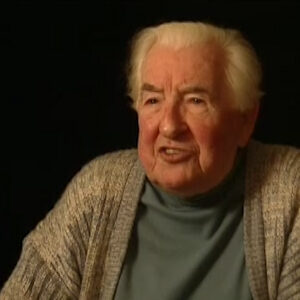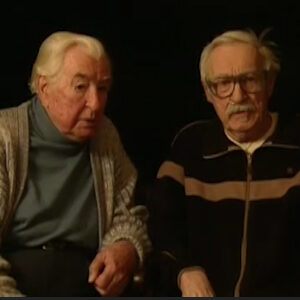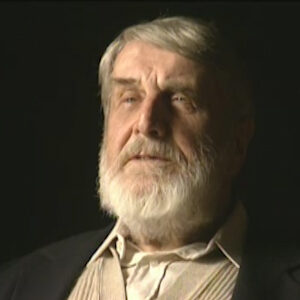Speaker So tell me about your family, your earliest memories.
Speaker It was about four and a half, five years old, and I remember it.
Speaker I was in kindergarten in. And their memory, I was take part in a little play their.
Speaker You think?
Speaker I was wearing a dress that someone gave me. It was long hair, and so I took a ribbon of belt or something and wrap it around to lift it up. And while I was playing, I got sick. They called me from school, which was very close. And my father came and picked me up, brought me home and took me to the county hospital.
Speaker And they had learned that I had the mumps. Well, I didn’t go alone to the hospital because we knew that if I had the mumps others together to. And they came and they took two or three of us to the hospital.
Speaker We think.
Speaker Tell me about how many of you there were in your family? All the brothers. Oh, yes. Excuse me. I’m sorry. Yeah, I guess.
Speaker I’m sorry if I can perhaps just skip it like you see.
Speaker I was always close to my father because many times when we were sick, we were quarantined in our home. They used to put some tapes across. He couldn’t come home. We couldn’t go out either. It worries me because I didn’t I didn’t know where he was sleeping, what was happening with him. Later, I learned that there was somebody living above us. My name was Tough Ski, and he was organizer for the Iraq inmates. Clothing workers and everything. My father was well within the building they amalgamated at the time and they needed to have some, what you call them, slugger’s. Someone would take care of the scams. And so he was one of them. I was very close to him because I was worried the other members of the family went their own way and just like bother you.
Speaker Right now you can look up at me and looking down.
Speaker Yeah. At any rate, I was very close to him because I was worried about him. And there was an attachment between us, more so than the other members of the family. Are busy doing their own thing. Interested like children are. And always after that, I was very close to my dad.
Speaker I’ve heard that he has ambitions for working and doing well, that he would be the one that would go and do the shopping and bring food home and make breakfast. Can you describe what.
Speaker Yeah. Yeah. Well, this was later, of course, but he used to go down to the National Biscuits Company because there he could buy broken cookies. You know, and he not only bought it for our family eat, some of the neighbors were no better off. And we. So he bought four the members of our mail. It was all so.
Speaker At any rate, I was worried about him and this brought us closer together. With that, many of our interests were the same. So what are their interests? Socialist movement was roaring about that time, I think Eugene v. Davis was in jail when he came out. Then my father used to go see or hear him speak. And many people my age, a little older, perhaps were involved in Lavers activities.
Speaker Do you remember your father’s interest in music? Did he like to take when he talks about going to concerts in the park?
Speaker If you go to any of those, you remember taking you to dance with that later when you were older.
Speaker And he was not going to choose the path, as far as I know. It was later when my father was out walking with Hairy Freddy and Barney around Independence Boulevard. It was perhaps an let’s see. He heard some music coming from a temple, very independence full of art. And he was curious. He went in there and he gave both the three boys the instruments. He was the smallest one. So they gave the clarinet. Harry was. The older of the three and he play the tuba and a bass. I don’t remember whether if Fred had an instrument, too, I think it was a trombone. But he was not one of the gifted ones. Then he just took the instrument as if he was born to play it. And that’s all. And then someone said, yes. Did he go with the whole house? And he went to the whole house. And it was directed then to the first term, that is, of the Chicago Symphony, who is retired at that time. And he offered he volunteered to teach many to play.
Speaker With that, it is just plain to the exclusion of everything else. You know, just as if he was born to play the instrument, that my dad had some musical background.
Speaker If if it was not music, he had some type of artistic. Involvement. You bring home little hand painted. The cups and saucers that he bought in the dime store and they were placed on a little. Like a little balcony. And they were exhibited in the house Eppley. So but the history of music. I don’t know whether he realized he came to this country when he was about 17 or 18 years old, because at that time he was born in, what, some place in white Russia and. When young boys were drafted to go and fight for the Tsar and they did not want to do that. So the first opportunity that they had left and came to this country, he worked in the tailoring industry, but they didn’t. They brought their work home. They were working peace or harmony at home. Various parts of the men’s clothing. My mother then, too, came to this country. She was orphaned. Her father from her father when she was about six months old. And when she was 13 years old, she came to visit her sister. Her sister wanted somehow. Yet the few dollars income, you know. And so she also worked at home and they met one another. They said it told me that she saw just that she wanted to get out of the textile industry.
Speaker So she had to say, if you can look up at me. Yeah. Right.
Speaker She told them that she hasn’t been. He hasn’t. I think she’d like to get married. And that’s how it was. Yeah. Then immediately and have a family. The women, of course, were working at home, not working. Were house mothers. No father was the breadwinner. And together they began to raise the family. And it came pretty fast and furiously.
Speaker Tell me about that. Tell me how the family came first. Tell me about your brothers and sisters.
Speaker Well, first it was an older sister.
Speaker And in the Jewish families, I guess, and family, generally, the oldest person in the family sort of assumed that they love Israel, too, because with so many children, she needed help. And.
Speaker Have you heard my brother, little Billy Charlie? Because there were two Mosen in the factory where he had worked and so they called him Louie Charity to distinguish between both men.
Speaker There he met his wife and he married, of course, many years later and after he had been Maurice.
Speaker Janine Cerrone, Morris, three of them, and they were born in Baltimore, but they wanted to come to Chicago and I was born in Chicago and they decided if I was born on the train or a boy, they’d need to be the conductor for it. So it was a finds name for me and I was a force in the family then. So she was less than two years younger than I was 19.
Speaker Harry, Freddie, Fanny. And.
Speaker Seven years older than vanished. Yes, I remember when I was graduating from grammar school. Why they couldn’t come to my graduation because the oldest daughter, Leanne.
Speaker She was in Whinfield. I don’t see if she had TB, but she had problems, you know. She felt that she was probably a burden for a child. These so many years ago that, of course, I can’t remember the details. You know, remember when you went to work? Yes. I went to work. Look at me. Yeah. Yeah. Yeah.
Speaker I went to work when I was 13. My mother said, Girl, your rage can go to work. Already earned three dollars a week and bring home a little bit of money to the families coffer. So I did. And about that time, I was working in the Mail-Order house. It was all around outside my house. And we worked quite hard. I remember distinctly our boss was riding the elevator around this fast and they the trains were sort of. Tied to one another and the bus made a festering and I look at him.
Speaker He’s nicer. I thought. He feels so happy if he just fall off the elevator. He’ll go. We were driven so hard at that challenge. Did you?
Speaker Give me just a second.
Speaker Would it be better if you were either lower or maybe more towards me? I can be a little more towards you and a little lower because I think that might help. Yeah.
Speaker We didn’t consider ourselves poor when I saw the first picture of Barney. And they showed we were living near Mt. Sinai Hospital there. I wrote to him and I told him I was coming back from New York at the time Fred was married at the time was in 1955. I think when the book was published and I wrote the letter and I said, I can’t understand why you portray yourself as being so poor. We lived across the street from the park. It was a nice Jewish neighborhood. Some of the finest doctors were neighbors. A black she was a gynecologist. Danny Leventhal, who went to California and he was stationed in the. Around the ballpark. So, you know, there were many injuries at the time and I thought that we were pretty well off, you know. And I wrote him a letter and he wrote back to me or he called me and he told them, listen to he says, I did, you know, that Hollywood likes to show people is coming from poverty to riches, you know? And that’s what they want to do. So I gave it to them. OK, that’s it.
Speaker What kind of jobs did your father tell about his work?
Speaker Well, he he worked.
Speaker Yes. A dad or pops.
Speaker Yes. Did he work at that time in the textile industry? Ha ha. What was it? I’ll go check again.
Speaker Because you were looking down. Yeah. OK. Yeah.
Speaker He he worked for her chaffe nine months.
Speaker And after that. Let me think.
Speaker Until he wants to get out of the factory and he bought himself a newspaper stand on California in Madison. But when I read about him being. In the stock yards, I was in Dayton because he never was close to the stock yards. Was it collodion then the brought about? No, it wasn’t. It was a later. Yeah. About him. Were he in the stock yards, yards and coming back greasy? When I read that, I was indignant. I wrote a lengthy letter and told him that he shouldn’t compromise himself. It’s a matter of fact, the city of Chicago wasn’t much further west than California Avenue. It’s extended maybe to Cicero Avenue. And so we moved along with the population that direction.
Speaker You remember the whole San Francisco area?
Speaker Yes, I remember this.
Speaker Describe that.
Speaker Well, the absence of Francisco Avenue was a right for that. I think it’s still there. It’s next. And Shepherd School. And we lived on the third floor and we used to get the fuel, you know, coal on a pulley that used to get up and go to the store and bring home bakeries whenever we needed an. And this was pretty nice living. There weren’t too many people at the time that were living in the invaded buildings either. From there we moved in the steam heated building. It was California and 13th, about 13 unto itself, but it was really a low base. There wasn’t any it wasn’t more than 24 inches from the street level. That then. Try to make it easier for them to make the family more comfortable.
Speaker You told me yesterday your father found out about Holehouse. He walked all the way to Holehouse to sort of find out about the lessons, then come back and get back.
Speaker No, no, no, no. It was during the Roosevelt there and Roosevelt at the time. Recognize the Soviet Union? I know that we were at odds with them at that time. And.
Speaker Somehow, this was very comforting, both for the doctors and the pharmacists, because they used they used to get their prescriptions drugs for medicinal purposes, but they used it for building synagogues and churches and whatnot. In that time, they were building. No, they had already built the Cahill a Jacobs Swiss, which was on independence and Dulles Boulevard near independence. And he was took the three boys and took him out for a walk in the sleigh. He heard the music. He said, let’s go in and see what it’s about. And of course, something happened, which doesn’t happen today. They gave him three instruments, didn’t cost him a penny. And that was then. Started to play and he played to the exclusion of everything else.
Speaker I saw a musician today who was a friend. Also studying with Benny at Holehouse Art Holdings. And he told me I asked him, when did you decide you were going to be a professional musician or that this is what you wanted to do? He said, As soon as I started earning money and I saw how much I could make as a musician.
Speaker You remember when Benny first started to work as he was never paid as a musician. Then he was too young and they had orchestras there in the moving picture houses. There was a Central Park theater. They built the Chicago theater at that time. The Tivoli. And he’d go wherever they would permit him to play. Not with the orchestra, but in the background.
Speaker And he was beginning to learn to read music. And there weren’t many people at the time that were reading music. The musicians who were crossing the Lake Michigan on those boats to go to South Haven and up in Michigan.
Speaker They were they played by ear, but they played well. And so he began then two trusts, Lake Michigan, go to South Haven. And wherever they permitted him to play, he went there.
Speaker So did he start to bring money? You remember the first time he brought.
Speaker Oh, yes. He brought home some money. And my mother went to his purse, his pockets. And she thought she took some money then because she was expecting a baby.
Speaker It was his money. That perfect for me and her, you know, to buy the lay it. Or is your own? I was married at the time. Really? 19 years old and we were visiting some friends, a doctor who was living around Kedzie and forty three hundred north south. I mean, and she called me, he was very excited. Something terrible has happened with my life. What happened?
Speaker I can’t tell you on the telephone. I can’t tell you. What is it I said? Has she got cancer? No. She said it’s worse than cancer. I said, what could it be? I don’t. I can’t tell you. Meet me at Roosevelt Road. There was a flower shop on the corner like that. On a bus. Street car, not buses. And I came there and I said, what? What is it, worse than cancer? She said, yes, mom is gonna have another baby in six weeks. And the doctors diagnosed it as a tumor or anything. But this time, she happened to go to a doctor bear and he was the chief of the. Obstetrics, said Michael Reese Hospital. He delivered her when he was born. And he said, I’m a good man. You’re going to have another baby boy in six weeks. Well, one minute got that word, you know. She thought she had enough with every one more to take care of that. Of course, everybody was crazy on him and he was born. And as much as Leanness objected to his birth, she was the mother figure.
Speaker What kind of things did she do? She became the mother figure. What would she do?
Speaker Well, mother was busy. She was having another baby all the time. So she’d take care of the older one who was not much not much more than two years between the first and the one who was coming next.
Speaker So how many brothers and sisters did go together? We had 12. Then you remember I think his future were telling me yesterday when Harry and Barney used to start going around together and looking for other jobs to play and they went to the south side.
Speaker Yes, I did tell you about that, that Harry was already working, too. He worked as a tinsmith. He wasn’t he wasn’t very old. That’s for sure. And then they were building the theater ourselves south. Was it a hotel? The South more hotel. Seventy first. And then he was going to play there. And. My father looked forward to hearing Danny play because he had never heard him and he’s going to get collect enough money to buy himself a suit. At any rate, he never got there because he was on his way home. And we live then on Jackson Boulevard, about 40.
Speaker 240 300 wist. He was killed. A Italian boy, there was a Cinderella ballroom there.
Speaker He just said, if we said it like he was murdered by Italian boy, he was run over. He was run over me with my. Yeah, yeah, yeah.
Speaker And they took him to a hospital. Varies.
Speaker So he started getting. He was on his way. He was from a distance.
Speaker OK. He was on his way home from the newsstand and he crossed the street on Madison Kassner because we lived around Jackson at the time and this guy had been drinking a little bit. He ran over him and they took him to a hospital on the corner of Hamlin and Jackson.
Speaker And, you know, there was warrant.
Speaker That means that we have today of giving people attention. They didn’t last.
Speaker And you didn’t find out about it right away. You remember when you found out?
Speaker Yes, I found it six weeks later.
Speaker I have a soft drink of ginger.
Speaker I’ve found out if I have a drink. Yes, Stray Bremnes was our new landlord. And when my father passed away, she was afraid that there’d be nobody.
Speaker Mrs. Abrams to help pay the rent. She was about ready to kill her, to evict her. Anyhow.
Speaker I’m sorry, could you say that again? We’re looking.
Speaker Yeah, yeah. The landlady was about to evict her.
Speaker And so.
Speaker I went to court and I represented the family. And I told her that we we would get along. We’re a big family. Each one earning a little bit lift. Continue to live that way.
Speaker Do you remember when Benny let me finish? OK.
Speaker General John already.
Speaker Do you remember when Benny left home for the first time and went out of town?
Speaker He went to work with Ben Pollock in Venice.
Speaker Yeah, well, he went to the West Coast first and then he came back to Chicago and he started to work with him at the Sallisaw Hotel. And I remember that. Then he told me that the owner of the hotel told Betty Pollock. He said, you can keep your van if you give me that, Jewboy.
Speaker How how old was he when he went to the West Coast? And remember how he got there?
Speaker Yes. He had been in New York nine.
Speaker He moved to New York in 1940, moved to New York when he was when he was just like 16. Van Park took him out to the West Coast for the first time. And that was the first time he’d left home. You know, remember, Daddy, how he when he went by train or think know out there.
Speaker So I know that it was about. About twenty nineteen twenty six. Because at that time. My older son was born.
Speaker And for the time that my father was killed and it was that time that Benny was playing at the cell from our hotel, and you didn’t hear about your father because he didn’t want to tell you? Yes, I was outside with David and somebody walks over to me until they didn’t want me to know because I was expecting baby momentarily. They said, I am sorry to hear that your father was killed. And I was shocked because I had seen them the night before. And he was our neighbor was died at the time, I don’t know what how he died, but it wasn’t a natural death. It was a an accident somehow. And I said, listen, if something like that happened in our family, we wouldn’t live through it. But here I was already six. That baby was already six weeks old. And I wasn’t aware of the fact that they would hit that my father had died.
Speaker They kept it from me. At the same time that he died, my mother came to visit me at the hospital. Because she didn’t want me to know that. My father passed away and I said to her mom, I said, you know, I had a dream last night.
Speaker And I dreamt that I had died and my hands were skeleton, like Kidney said, I did do something for me. Chiefs came to the hospital, so I wouldn’t know anything about my father. And she said, you know, you’re speaking like a yenta. You know, the answer is yeah. And my father was at that time in the undertaker’s. Weinstein.
Speaker On Roosevelt Road about Central Park. Okay. I took it for granted until I learned six weeks later.
Speaker You remember the the year then with checks, there was another apartment. I didn’t ask about this.
Speaker I need you to tell us about the one on Jackson Boulevard. Did we do something about.
Speaker Remember when other musicians used to come back to the house and your mom would give them stuff to eat when they still lived in Chicago? Jimmy McPartland would come thank you, told somebody an interview that your mom would feed them chicken fat, some stress special recipe she made. Listen, when you talk to somebody else. Remember the jazz musicians coming home, if any were you playing with?
Speaker I don’t understand question, sir. You remember when Benny was still very young? Yeah. Home in Chicago. Yeah. The musicians would come to your house so you could because you told me yesterday about the house near Mount Sinai.
Speaker They all came to our house because Harry James was playing with them at the time. And I think Ziggy Allman was there. And he I mean, we’re part legend was there. You know, these were the musicians who really they formed their own bands and they would come to your house and play. Oh, they would play. And, you know, it was the swing orchestra. And we were living just across the street from Mount Sinai and California and 15th. And the morgue was on the side of the street, too. So they said bored to Chicago because they were they were taking him out of there to the tune of swing music.
Speaker Did your parents, my dad. He was playing jazz. Did they think that you’ll never make a living playing this sort of crazy music?
Speaker Nobody paid that much attention to anyone else and family growing up. So we each went our own way. I told you, Harry was already working as a tinsmith.
Speaker But then he and Benny started to play around yesterday.
Speaker Well, Harry having sort of a tough time because he was playing in Benny’s band. And when he was playing there, he thought he wasn’t good enough, but he would play just because Benny was his brother. And if he wasn’t playing with Danny. Then it is not good enough, you know, for sure.
Speaker But he had his own band and they were still youngsters in Chicago. And you told me that they would go out together and look for places to play. I’m talking yesterday. They would look for a place. They would look for jobs together. He sort of helped Harry out when they were starting and they got to hang out together. I would go and play.
Speaker They played. Anyway, in his own way, he played wherever wherever they would permit them to play. He couldn’t play together because they didn’t belong to any union later. This was about I’m going to say it’s recent. It was about.
Speaker See?
Speaker Danny called me and I told him I had moved to the.
Speaker Edgewater Beach Hotel. I said to him.
Speaker Do you remember the Beach Hotel? He said, Do I remember that? He says, that was the first place I couldn’t get a job. I said, How come? Well, he said it wasn’t old enough. Is it that I went down to the Bureau of Vital Statistics and I got the birth? Yeah, the older brothers. I don’t know whether it was Lou or Morris. And it came back there and I had a I became older than I was. He was maybe 15 or 16 years old. And he went and he joined the union.
Speaker And then he came back and they hired him.
Speaker I’m sorry to have to. OK.
Speaker Of all the accidents, but it was when Betty came back to Chicago and played at the Congress Hotel after his first big success. Your husband had the accent?
Speaker Yeah. Yeah. My husband had a stroke.
Speaker Start with Betty. Tell me when Betty came from California.
Speaker He went to pay the hotel and Harry came to visit me when he came to my house. He saw a sign on the door.
Speaker I think that.
Speaker He was I was with my husband all the time. He was in the hospital. He had an accident.
Speaker And.
Speaker Terry came running through the hospital at the time and. He learned that my husband was in an accident. And he was quite sick.
Speaker Anyhow, Danny, when he heard about it, he came to the house and he was learning that time that the car was hotel three hundred dollars a week. He brought his pay to me all the time because if I had no other means making a living. My husband wasn’t working. There was no money.
Speaker Women were not employed. House fro.
Speaker Was it before that or after that, you told me he also helped your mother out when she needed money, that he was bringing like a hundred and fifty a week.
Speaker He said he brought all this pay.
Speaker He loves my mother, had no means of living because Benny was working at the time. He’d just started at the Congress Hotel and he was earning the street hundred dollars. And when they heard that my husband was in an accident, he brought his kid pay to me to, you know, three hundred dollars, went from his pocket mother to me.
Speaker Then you remember when your family followed him to New York or he moved them to New York? Tell me about that.
Speaker When he moved to New York. This was about in. I stayed here, but he took my mother and the kids with him to New York.
Speaker And they were living in Jackson Heights at the time, and I didn’t see him for a few years because they hadn’t moved that time and Ruby Keeler is home.
Speaker And I couldn’t go to New York and leave the children home, my husband home. I think Heath, for a long time, he supported me and my mother. Two, he left nothing for himself.
Speaker The famous Carnegie Hall concert. Tell me about what happened when you went to.
Speaker When I went to the concert at Carnegie Hall, I saw a ticket there. You know, I was pro labor all the time because I was close to my mother, my father, I mean, not my mother. And then. I told you. Look at me. Yeah. I thought if there’s a picket, I’m not breaking any picket lines. I’m going to turn back and go home to Chicago. But a little closer and started to read the the ease riding on the pickets, you know, and they said. Then don’t go into the concert or that he’s a communist because he had paid for loyalest Spain.
Speaker And then.
Speaker I think Spilman was the cardinal in New York. He had his words. In the end, one of the tickets to your act was a communist. He was the surreal. Well, if that’s the case, they go to hell. I’m going right. They can do whatever they want. They’re Fickett.
Speaker Second, do you get it all right? Yeah.
Speaker I mean, you don’t have to go into that building yet.
Speaker Tell your father’s socialist interest and stuff. Tell me about the workers. Circle the circle. So my my voice was still there. So start again.
Speaker The workmen’s circle. Look at me. Yeah. I’m trying to think it was the word that circle was a. Was there was a Jewish press in Chicago and one represented the reactionary wing. The labor movement and Jewish paper. And then there was another paper that was published at that time was called The Freiheit, which means freedom and.
Speaker Remember where they held the meeting?
Speaker Yeah, they have their meetings.
Speaker The. The Workmen’s Circle papers around. Kedzie Avenue, 13th Street.
Speaker And your father would go there and and bring Benny sometimes to play? No.
Speaker That I was involved with the Freiheit, you know. Yeah, they pay. I’ll tell you a story off the right.
Speaker You know, you got the cameras bread from five to ten cents a pound.
Speaker They need to act. To me, they started with the four. But we wanted to expose them as being. And our labor.
Speaker Well, let’s talk about you. You said it must be that your father’s political views.
Speaker I wonder if I had anything to do with Benny in later years. You talked about what he was when Teddy Wilson came into the Ambassador Hotel and he would tell that story.
Speaker Well, it wasn’t a political views. My father was a free thinker. He had no religious bent at the time. Tell. And. I went to see Benny and he was in the Ambassador Hotel there and they were waving. Yeah, yeah. Then he was at the Ambassador Hotel then. And he was waiting for Teddy Wilson to come. And Teddy Wilson came there and they would not permit him for some men. And then they asked for a reason for. And they said he hasn’t got a tie on. Then he said, well, we can correct that. He took his tax tie off and they put it on HEDIS, you know, and they were hesitating. So he said, you don’t let him in because he’s black. He said, you can go to hell. We’re all going out of here. We’re not going to play here as long as you don’t let any.
Speaker And that’s what they did.
Speaker He said the same thing happened in Detroit.
Speaker That was in Detroit when he was playing there at the Statler Hotel and we were living outside the Statler Hotel. I was there with my children. Fred was born at the time. So that was about even. Let’s see.
Speaker Fred was born in nineteen.
Speaker 31.
Speaker And we had the same experience there, too. I went to visit Ben there and they hit. Katie was with him then, too, and they wouldn’t permit him to come in, and so barely by that time, news had reason for he had his previous experience. So he said, you don’t want. We’re all going and they left. It was just because he was you know what it was, it was embrace the racial issue, you know. He knew no color line. He just knew that there were musicians who were good. And he was going to play with them. And he told them, he says, I’m only one man. I’m not an orchestra. I can’t play without the orchestra. These men are black. So be it.
Speaker Anything I’ve left you to discuss the airplane trip after being very up to Bam! Those pictures, that that’s. Wait till you’re ready and take it down.
Speaker Well, then it was to pay me to get that straight in my mind.
Speaker Yeah. Explain the circumstances so I’ll understand. Yeah. He’d been having bad kids for a long time. Right. Whatever.
Speaker He was having bad time. And so he decided he was going to Rochester and have them see what they could do for him. He went to Rochester and he had surgery. And when he gets through, he’s very uncomfortable. He decided that he wants to go up to Banten Lake Louise and recuperate there. I was close with family at the time. And so he called for me to come back. And he chartered a plane. It was like a little Ford just accommodated four people. My husband was their mother.
Speaker And then. Well, there must be room for the pilot there. Right. One of us was not there. I know. My husband was there. I was there. And your mom was there. My mom was there.
Speaker Anyway, so you went you went up there and they messed up the operation, is that what had to happen?
Speaker Yeah, they were just starting to do the type of surgery. I think it was called. Laminectomy. Yeah. They fused bones, you know. And this is back. He was never the same after that. Because was a Dr. Love who operated on him. There was a new procedure. And evidently he he just didn’t do a good job.
Speaker Do we get that was when she leaned forward, was that a problem with the. Was.
Speaker There any other stories, things that you remember that stick in your mind about your childhood and Benny or about it later on you think would be good stories to tell that we haven’t touched on?
Speaker I noticed in the book that I read part of it. Yes. You had developed some sea surgery that I never wanted to speak of.
Speaker We won’t know. No. More about success. What did Betty change when she suddenly had money and was a big success? Is he the same guy you knew when you was your little brother? Must have been.
Speaker Yes, he was very loyal. He very good. When I think when bad things like Louisa with him that time. I think that any sister got involved, you know, with family, because John was in the the lead for peace and democracy and I was there, too, and they recognized and knowing Danny at the time that somehow we had something in common. And so. Danny, that time had played. They had played Carnegie Hall at the time. Carnegie Hall was in 1938. Yeah. And we yeah, we just spoke of it.
Speaker The operation was after that. Yeah. You would have gone to bars after. Yeah. Oh. Tell a story about one after Carnegie Hall.
Speaker He said after Carnegie Hall mother had moved to Vevey. Was there. You know, he was a father figure of course. And we went to their apartment. And by that time, he lived on Central Park West and they had a maid and a butler there.
Speaker And.
Speaker They were serving just like maids and butlers do, my mother was very angry about that. She said, listen. When I was poor, we put the food on the table and we all eat. We eat together. We’re family. Now she’s have to wait until they give me a piece of bread and then they bring the meat around. Something else I don’t like their little. I want to sit down like we did when we were kids. She called it poor because by comparison, their circumstances then, you know, they had already played Carnegie Hall. I don’t want them to tell. I was satisfied. She said when we got to the table, when we all played together, I don’t like that. I don’t like to beg them for a piece of bread. Well, you got plenty of it. Now.
Speaker Musicians who played with Benny said that after the Congress hotel job in Chicago, when he first came back about the time that your husband had his accident, did Benny change that? He became much harder taskmaster, who didn’t seem to have as much fun anymore. Before that, he’d been carefree and fun loving and pretty easy going after. After he sort of became a success. It’s almost like he became nervous that it was going to lose it, that it was going to go away. He started to push hard.
Speaker So success didn’t go to his head. That time they have to do that. The family moved to New York and they were in Jackson Heights. That was a new neighborhood in a nice neighborhood.
Speaker I’m sorry, you. Back. Well, if you use your child, let’s say, with a tape shot anyway, I’m not that. No. But yes, there is there to almost a second. Sorry. Transporting another piece of tape to the tape is going to go far side.
Speaker To fix our thinks. Are you are you going to drink? That’s my movie.
Speaker You talked about John Hammond meddling and it’s in everyone I’ve spoken to about Benny. There’s this funny thing about their relationship and the way they were very close.
Speaker But it was also John Hammond liked to act like he’d done everything good to take credit. And he always was sort of interfering and playing around. Jimmy talked to any bad relationship with John.
Speaker Well, I asked him what’s happened between you would in the end. He says we have nothing in common. But in reality, when the boys were away, my sister Ethel took up their music business, you know, and she carried on there. She did a good job. She didn’t let anybody even look at the books when the boys came back and they wanted to know what the business was all about. She knew in the way. This was a baby that she held on to until they came back from service. You know, Harry was in service and he was not in service because he was having trouble with his back. The time. I think Fred was not in service side. And then he raised.
Speaker I get lost here. So tell me about Ethel. How did it feel? I’ve been a bookkeeper in Chicago and then she went to handle the bookstore. Yeah, she went to my question will be there. So you tell me.
Speaker Yeah, I guess I’ll follow Danny. She saves the business for him, and they were doing quite well. They didn’t know actually how good it was, but it was damn good. And all of a sudden, John. Then he came and he wanted his share of the business. He wanted to get out. Boys couldn’t understand. They didn’t even know how good the business was. Anyhow, they bottom out for twenty five thousand dollars, which was nothing.
Speaker John felt the event he was interested in the Hammond investment in their business at the time they get in. He he learned to. Curse that day, too, because I think that the boys were then making more money than Penny was explained about the business.
Speaker The business was the music publishing business.
Speaker You know about the business that I was running, that they wanted me out.
Speaker What was that in that letter? I think that I wrote to Ben at the time. I told them. That they didn’t treat my brothers right, because they then he didn’t even want to play any part of any song that he inquired from the business. And I told them it wasn’t right because they were really loyal to him. But he came in. Many did, and I think it was a device, a device of the Hammonds who want to get out of the business. They made a deal with them that he was going to sell his share for twenty five thousand dollars. He didn’t need that money. But he was part of the Hammond family already.
Speaker When I went to him to with him. To. Vamped and Louise.
Speaker He was recuperated from his illness, he was in bed there in Hamman. Alice was following him.
Speaker You know, she went on a steamship, a fruit carnival. To leave her has come to stay with Bernie. He had bought a home then in Mount Kisco and that was quite a nice place. He bought it and it was eighty thousand dollars. But he got so much. Property live, and he sold parcels there. He was a very rich man. But they wanted this. Twenty five thousand dollars.
Speaker I think he was very sorry that he showed his share to them because I think they had more money at that time than he had and he had plenty.
Speaker Now, you you didn’t think that the marriage would work out with. Your mother didn’t either. Right.
Speaker Said, you know, my mother went to Alice and he was married and she had three children. And my mom said, what do you want him for? He’s a young man. You’re an old lady. He’s got three children already.
Speaker She wasn’t pleased with the marriage at all. Well, you know, I wasn’t pleased. I told him, listen, Benny, she’s not for you.
Speaker You’re going to be getting life where she’s living it off already. And he brought in some records for me to take on to me in New York.
Speaker You’re going to try to push out, as the father has.
Speaker My husband told me about it. He said he told me that. Then she came to him saying she is what? So she said, yes, my sister came to him. I said, I think she intends to stay there in New York. I was taking her place. That would be my thinking. Oh, my God.
Speaker And she was why was she afraid? Because she she really liked Benim was afraid. That was her special.
Speaker She loved the E.A. when he died. And in his will, he left me five thousand dollars. And her five thousand, she didn’t need his money, but she called me and she said she never wants to see him again. But she made sure she arranged with DNG that when she died, she would die, that she wanted to be buried next to Benzi. Next, Benji to Benny. Oh, yeah. Today, it was a very special. This was her life. Danny was here in life. She never married because she was waiting for her lover, Danny. He was there for.
Speaker I’m wondering if maybe it would be fun to have you read the letter. Would you like to read the letter? Yes. Do you want me to be. Great. Now I give you your glasses. Yes.
Speaker Let me just see if there’s any parts that we’ll skip. No, I don’t think they think I came back from a second. Let’s go to make sure we get a nice frame.
Speaker We have to see that it’s a letter. Maybe once just starts, I’ll go down a little bit because I’m pretty wide here. Yeah. That’s that’s good. You start. You got your. What can we do?
Speaker Can you. Can you hold it up to read it so it’s no higher? OK. Get over there. You hold it up that high. That’s great. Hold it. Hold it as close as you can to get it. I like this. OK.
Speaker Read married in 1955, and of course we wouldn’t. My husband and I went to this wedding.
Speaker And at that time, we’ll just just read it like, oh, you explain what it is. Yeah. Sorry it started, I think. That’s OK. I wrote a letter to Benny and I said I was best friend. I wrote a letter to baby sit on the phone.
Speaker Next door is ringing. We’ve got to wait till it stops ringing. We pick it up on the microphone. You hear the phone ringing here. OK. Oh, yeah.
Speaker I wrote a letter to Bernie and I said, I’ve just returned from a trip to New York attending the wedding of Fred. And at that time, I had an opportunity to speak to Gene, Ethel Lou and to discuss the script. I think it’s fair to tell you that we are strongly disapprove of your portrayal of the Goodman family. While it’s true that it is a story of your life. We, too, are Goodmans. And in that sense, it reflects our lives, our background, our parenthood. And we feel that it should be filled with injustice to all of us. Mine included your story equally as ours. I know that basically you feel as we do, that our families do not want to be ashamed of as American families go. We’re a cross section. Have American people all working and earning your living? Honestly, to the best of our ability. And we can be proud of one another. We know that Hollywood has its approach. But certain basic truths should not be compromised. We were not raised in a family of hoodlums. Francisco, California, used 30 years ago as a middle class Jewish neighborhood from which emerged many of the most outstanding Jewish doctors, lawyers, businesspeople and artists. Victor Yang included. And it was a great sacrifice that move. They’re aspiring to give his children the best within his means. Dr. Danny Leventhal, that’s Jareb Leisz, to mention two of the country’s finest surgeon lives in our neighborhoods culturally. And it is me your way. I was an artist buying records before a record collecting was a fad and pens and purchasing hand painted, sharing it from the dime store to a debt adorn the panels of our dining room. To minimize the stature of your parents and their aspirations is to detract from yourself and from. The picture as a whole. Do you remember the joke since story? The most moving episode was a tribute which she paid. As son to his father and then the unity of family, there’s a whole. Portrayed in the anniversary waltz. If it’s your desire to elevate the Hammond family and their relatives, that’s your privilege. They contribute nothing to your success. But do not do it at the expense of yourself and the goodness. Remember, Vinnie, that your story as a musician was written before 1938 and to deny that this did not deny your birth right, to tell the story honestly would add to your Larae, though any embellishments can be added if you desire. Nor have we anything to apologize for. Mao was never stricken with the home of the Hammonds because in his. Story, you know, Mother. This is not in this letter. Yeah.
Speaker Look up and take your stuff. Yeah. Yeah.
Speaker You get it. I was never on strike in the home at the Hammonds at that time. Mother lived at Central Park West and had a maid and the butler in her home. Which was provided for by you for what? Ma’am. Mom never in V12. To her, a happy and healthy family was to have beautiful children. And that was the epitome of wealth and success to her. If you were ashamed of your heritage, that’s your privilege, though, I said Siri. Doubt that you did, but do not degrade them. I cannot believe that consciously. This was your purpose. But the total result seems to be precisely that. What family would permit the jury Gironde story to be unmentioned? It would add to your stature as having made our country attributions as Americans in the war against fascism and for the rights of our people. You may never answer that in sequence of time. It doesn’t belong. If I remember correctly. There are many chronological errors in the script. Is it accidental, the death toll? And Lou, who’ve rejoiced in all of your successes and suffered with every setback and who have even contributed to your success should not be mentioned honorably in the picture that Mary mentioned in passing. Can your candor, loyalty and devotion of Lou was practically worship you for 30 years? This clip, Phillip, every newspaper. Religiously. Compiled it. Can his. Role in your success to be overlooked? Can you honestly impute to any member of our family. Harmful meddling as you can. To John. Who’s that? Who’s meddling resulted in your breakdown. And is it by accident that not one of the copy rights of the Regent Music Company is used in the picture? Irving Collodion was accused by critics of talking down to B.G.. The book, The Kingdom of Sweden, I hope that you will not make the same error magnified a thousand full picture will be a permanent document historically recorded. You must take into consideration consideration the full membership in the family of which you are a part. Forward to this integrate, that unity symbolized by your father and mother would only reflect upon you. I’m writing you now for fear that later I will have defeated your purpose. I hope that you will accept these suggestions in the spirit that they are offered as constructive criticism. Loving way. The meet called me. He said, listen, either he said, this is Hollywood. He just wants to show, you know, from poverty to riches.
Speaker But this letter. Was written in 55.
Speaker It’s beautifully written. It very nicely done on a couple of things. It reminded me I can take your body.
Speaker One is you mentioned the drone story. Tell me about your brother Jerome and what happened to him.
Speaker Well, you’re wrong. I was living in New York. And they were living on Riverside Drive. Yes. Eighty six street. And my mother came there to live, and my sister Ethel didn’t like it because she she was a baby sister, you know. And my mother never accepted that if there was a poor woman in the same building where they live. She’d make friends with them.
Speaker The blue bloods in those, though, know that building and influence upon her tall. And so I guess Jurong wanted to get away from school for a while. He wasn’t yet 20 years old and he decided that he wants to enlist in. They are my. And there was nobody there to put him straight. You know, we all went whichever way we went, that’s all. And before it was 21.
Speaker He told he came to visit me and he he felt that he was not going to live through that or jail. He didn’t like the discipline of the army. And he was sort of looking for me to give him advice as to how to get out of this.
Speaker He just.
Speaker He gave the impression that they were given instructions and they just did this. And if they didn’t, they could go killed.
Speaker And it wasn’t much longer than that. When I had seen just about twenty first first day when the whole ship. Went down. They were mutilated to the point that they were not even recognizable. That’s coffins or sealed. And we didn’t know whether they had all parties of various individual bodies funeral. That you could identify.
Speaker And it had many really hard. What I have been especially hard.
Speaker Yes, it did. I know that after the funeral, he played clarinet.
Speaker To him, music was everything.
Speaker He loved your own. Jurong was very handsome. He was six feet two. And when he was in Chicago, my husband and I used to go as a Grant Park concerts and the people used to turn around and look at him.
Speaker In the letter, you said that the most painful, the family, you were proud because it was a sense of the Goodman family had done something here.
Speaker My question will be there. So would tell you we’re all proud of him because in reality, he was the only one in the family that I had, an academic education.
Speaker Rest of us, except for Vinny.
Speaker We’ve had our own lives. And so you said in the letter that you are proud that he’d help.
Speaker No, I said that they didn’t mention Jérome at all. Why didn’t you mention it? I said that glory, you know, that he participated in the war against Hitler.
Speaker Another thing that I was reminded by in a letter is you, you. Talk about how John contributed with his meddling to his breakdown. Seven other people have told us that he really reached a point where things just got no he didn’t have to come in and break himself away from.
Speaker You’re from the Region Music Company.
Speaker He didn’t need the twenty five thousand dollars. But somehow the ham and the story every way megale the other.
Speaker The nice thing that I was reminded of in the letter was there was something about your childhood that sparked the memory. Oh, you’re telling me your father collecting records. Yeah, I remember that when you were.
Speaker When he was there, when you were all there in the family together. Someone brought a record player home on those photographs. We’re tell tell about that because I know that was port.
Speaker No, they. I wanted to know where are the artistic Ben came from? You know, how did Vinny ever become a musician and identify it with everything that was artistic, you know? He was buying 10 cent dishes, you know, and painted in Vietnam that that little like a little platform in the dining room. He’d bring them home and be identified with that.
Speaker You know, how about the records and the photograph?
Speaker They were records. Julie.
Speaker A as the labor movement. Yeah.
Speaker How about Louis Charlie by a photograph?
Speaker It was. I thought you’d maybe talk about this yesterday.
Speaker Yeah, that’s right. Yesterday when we were talking, you said that there was an old one of us wanted to be caught. It was in the house and they would play that. Listen to the records. You remember that?
Speaker Yeah. But these were right to the labor movement.
Speaker Actually, as I do the mathematics in my head, although there were 12 children. Yeah, you probably never all lives under the same roof at the same time since your ages were so spread out. No. By the time Jerome was born, you were on your own. Charlie. Charlie was on his own.
Speaker He was married. His horse was on his own. Maurice was married to.
Speaker So you never live under the same roof at one time. I mean, by the time.
Speaker Well, we all went our own ways, you know. He went wherever there was music, wherever they let him play.
Speaker He wasn’t being paid for it. Because he didn’t belong to the union. And then believing is where the Arkansas is.
Speaker We’re playing in the moving picture houses.
Speaker Is there anything else that you’d like to talk about that we haven’t asked you? We’ve left out?
Speaker Oh, I think they told you everything.
Speaker This might not be relevant, but your parents, your mother came from. Your father came from Russia.
Speaker By way of a South America.
Speaker We were about to say something else when John asked his question, I thought you were.
Speaker I just reminded myself about that time. When I yeah, when I was it live. We were living around Sibley and Taylor, their. And that was going to the Jewish people instead to.
Speaker I went to and in that same neighborhood about Taylor and Racine and.
Speaker Joe Hill, who wrote all these songs about the labor movement, he was being buried there.
Speaker And. When my father died. I thought of one poem that he had written.
Speaker Something. My will is easy to decide because I have nothing to divide my body.
Speaker If I should choose, I would to ashes reduce and let the gentle breezes blow someplace to worsen. Flowers grow. Perhaps these fading flowers would come to life and bloom again. Goodbye to all of you. Joe Hill surges in poetic form at best, is saying that’s yes.
Speaker I learned that you can remember poetry is something our generation that wasn’t planned to do. Did you learn when you were a kid?
Speaker I also spoke from the platform with Eugene V. Debs and in.
Speaker We’ll review part. It was poor.
Speaker I can’t remember that distinctly. It said something. Were the fearless bankers that lawyers, doctors, physicians. The aim of it was they’re not around anymore. Yeah. And toward the end, you sent.
Speaker Young children, the war, you know, he opposed the war, the First World War, to do your dirty work. I always kept in touch with labor struggle with, you know. These were the Pennsylvania Ohio miners strike. There was a Tom Mooney defense. In a place where workers were fighting for their rights. I was their.
Speaker You said that you did Joe Hill, who you had heard at the JPI.
Speaker No. There was the GPI. Came much later. That was in. That was day Roosevelt. Period. Yeah.
Speaker Well, that that was more than anything else, man.
Speaker I just know I just knew that wherever there is, I took my kids with me. They were on the picket line with me.
Speaker That’s great.
Speaker Well, thank you so, so much. You were marvelous. They’re great.
Speaker It was it was difficult for me to sort of piece this together because I so many years ago, almost a century old.
Speaker Your birthday early April. The first was an April. Just two more months. I guess I’ll be 91 years.
Speaker Do you think the way that the labor movement meant something very special to you, that it gave you something to believe in and fight for? I care about that.
Speaker I wasn’t alone because as the age of Eugene Debs and when he came out of jail. He ran for president that time and he got two million votes.
Speaker But I’m curious about your brother. How did Benny what was driving him? What pushed? What did he believe and what was he fighting for?
Speaker Starts that the clarinet to the exclusion of everything else. Nothing interesting. He just ran where he could pay to play the clarinet. He didn’t make any money.
Speaker He wasn’t old enough to be in the union. He couldn’t play with the orchestra.
Speaker But then later on, after he became a success, something was still driving him. What did he want? What was he trying to get played?
Speaker For the sake of play. He played for the sake of. I say this.
Speaker But music, wherever I heard somebody I used to go round is a pickle at the time, you know, it was bughouse square. And that’s where I met Studs Terkel.
Speaker I used to take him with me if they’d let him play. He’d play too. But they didn’t even appreciate music.
Speaker OK, oh, great.
Speaker Thanks, T.J.. Nice to meet you. And this is where you get the wrong town.
Speaker Think of something in cabinet.
Speaker So you think I would see about.
Speaker Ten days that shook the world. Who was the author? John Reed, Jack Reed with the Soviet Union and there who he wrote Ten Days That Shook the World.
Speaker That was the time of the birth of the Communist Party. Do you remember me asking you if you remember you probably weren’t born yet. Anyhow, you know how they operated then.
Speaker He needed surgery with a razor blade.
Speaker You know about how bad he felt when he went to Russia because he was the first American really to go behind the Iron Curtain with the band.
Speaker Oh, he was crazy about his trip there. They were crazy about him. He was there during the White Knights in Leningrad. And they didn’t let them go. He played throughout the night. And when he parted with some of the Russians, especially his guide, his music guide, they embraced each other and they both cried. They fell in love with one another. I wanted to go with him, too, but he didn’t want me around.
Speaker It was a hard trip is probably better for you that you didn’t go on having tried some of those places.
Speaker He went to Pakistan and some thus far. An adventure, but it wouldn’t be fun.
Speaker But he went wherever he could play.
Speaker OK, any friends that were guys in the band that you know, that he’s particularly close to the special.
Speaker Yes, I knew some of them that I can’t remember now. Yes. Yes, I know all of them.
Speaker OK, well, I guess it’s a. You say you said they’re.

